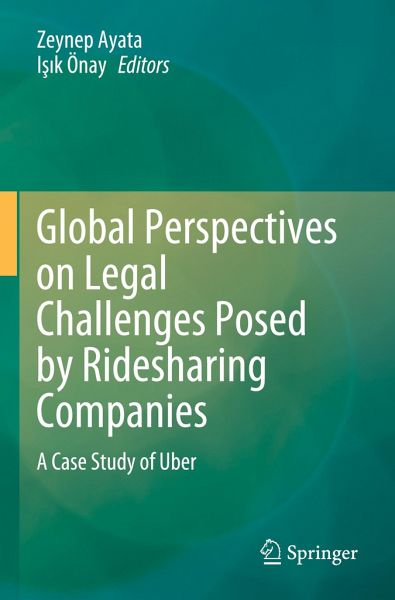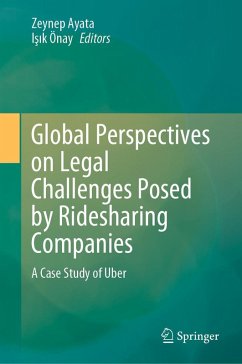
Global Perspectives on Legal Challenges Posed by Ridesharing Companies
A Case Study of Uber
Herausgegeben: Ayata, Zeynep; Önay, Isik
Versandkostenfrei!
Versandfertig in 6-10 Tagen
98,99 €
inkl. MwSt.

PAYBACK Punkte
49 °P sammeln!
This book examines how regulators and policymakers from nine different countries have dealt with Uber, and initiates a legal dialogue between different jurisdictions that could potentially pave the way to a harmonized approach in regulating Uber. The case studies, conducted in Brazil, Germany, Italy, Mexico, Spain, South Africa, Turkey, the UK and the US reveal the case law and regulatory responses that have been adopted in various areas of law. Legal issues relevant to Uber include market regulation, labor law, civil liability, consumer protection, unfair competition and antitrust law. The bo...
This book examines how regulators and policymakers from nine different countries have dealt with Uber, and initiates a legal dialogue between different jurisdictions that could potentially pave the way to a harmonized approach in regulating Uber. The case studies, conducted in Brazil, Germany, Italy, Mexico, Spain, South Africa, Turkey, the UK and the US reveal the case law and regulatory responses that have been adopted in various areas of law. Legal issues relevant to Uber include market regulation, labor law, civil liability, consumer protection, unfair competition and antitrust law. The book thus compares and contrasts the regulatory policy implications of the disruptive innovation created by Uber in the area of transport services.
The book starts with a conceptual overview of the legal challenges posed by Uber and concludes with comparative findings based on the individual case studies. In addition to introducing academics and legal practitioners to the theoretical and practical legal problems they may encounter in connection with Uber, the book will especially appeal to policymakers, who can benefit from and compare the experiences of other jurisdictions.
The book starts with a conceptual overview of the legal challenges posed by Uber and concludes with comparative findings based on the individual case studies. In addition to introducing academics and legal practitioners to the theoretical and practical legal problems they may encounter in connection with Uber, the book will especially appeal to policymakers, who can benefit from and compare the experiences of other jurisdictions.














